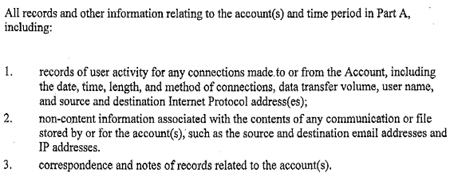How many Twitter followers does it take to make sense of a court order?
As noted yesterday, Twitter received a court order under Title 18 § 2703, the Stored Communications Act, to provide information on the accounts of some people associated with WikiLeaks. Rather than just comply with the 2703(d) order, which Twitter certainly had the option to do, it chose to fight it. As a result, Twitter got the court to agree to unseal the order so that Twitter could notify its users and give them 10 days to try to quash it.
I was, and remain, very impressed with Twitter’s pro-privacy and pro-civil liberties actions in that regard.
Of course, if Twitter received an order, the likelihood is that Google, Facebook, and possibly others have also received similar orders. Yet we have heard nothing from Google or Facebook or any other entities other than Facebook’s “No comment at this time” response. Did they receive orders and just comply with the order – including the provision that they not notify their users – without trying to unseal the orders? Or haven’t they been ordered to produce records?
If Google and Facebook have not been served, why don’t they simply issue a statement stating that they have not received any order, but here is what they will do if they are? And if they have been served, I would encourage them to follow Twitter’s lead and fight to have the order unsealed.
Not that I expect the DOJ to find any helpful information or evidence. The people they are targeting are well aware of security issues (Jacob Applebaum, for example, is the a programmer who has contributed to the development of TOR) and I would be very surprised if they didn’t take precautions to secure their own communications on any sensitive matters.
But where things really got interesting (to me, anyway), is that it seems that WikiLeaks’ lawyer Mark Stephen claims that the order compels Twitter to provide information on all of WikiLeaks’ and the other individuals’ followers. Zack Whittaker of ZDnet reports on a BBC news story that I have not seen:
Mark Stephens on the BBC News also makes clear that the court order will also cover the “600,000 odd followers that Wikileaks has on Twitter“
Chris Soghoian offers some insightful comments on the Twitter order on his blog. Some of the language of the order seems as confusing to him as it is to me and like, Chris, I look forward to seeing lawyers with expertise on 2703(d) orders chime in with their analysis.
The relevant part of the order is Section B of Attachment A:
Some (like WikiLeaks’ lawyer) seem to be interpreting (1) and (2) of that section to require Twitter to produce the IP addresses and other information of followers and/or those who DM the accounts.
Last night, WikiLeaks tweeted:
WARNING all 637,000 @wikileaks followers are a target of US gov subpoena against Twitter, under section 2. B http://is.gd/koZIA
Does following someone on Twitter mean that you have accessed or connected to their Account? Or by following someone, are you merely requesting that Twitter serve you tweets from that person’s account, in which case you have not connected to the account at all?
The issue was also raised about people who might send private, direct messages (DM) to the targeted individuals’ accounts. Does the order compel production of their information – and perhaps even the content of their DMs? Because Twitter does not enable a user to send a DM to anyone who is not following them and because @WikiLeaks does not follow any individual, no one can send them a DM through that account. The same is not true for other accounts included in the 2703(d) order, however, as those individuals all have people that they follow and who could presumably DM them.
If the 2703(d) order compels production of the account information or IPs of those who have DM’d other targets (and it’s not clear to me that it does), that would mean that potentially countless individuals are having their communications searched without any opportunity to move to quash. Legally, this might be the same issue as searching a suspect’s cellphone where people who are not suspects have their calls and records swept up in the search, but I await the analysis of expert lawyers on that.
WikiLeaks may genuinely believe that the order compels production of information on followers. They may be right, but then again, they may be wrong. Alternatively, and less honorably, they may be trying to engender fear – or anger – among their followers and the public as part of media incitement and fund-raising campaigns.
In any event, I hope the real legal experts offer their interpretation of the order and that the public and mainstream media doesn’t just uncritically repeat WikiLeaks’ assertion as if it’s correct.
[Applebaum’s credential corrected]
